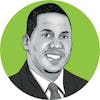 See
more of the story
See
more of the story
On Wednesday afternoon, ShaVunda Brown left work early and picked up her daughter, Lola, from day care because the child had not been feeling well.
The two rode through St. Paul and stopped at a garden outside the city's Mississippi Market Co-Op to enjoy the warmth. She had about 30 minutes before her hair appointment — her self-care for the day — and she hoped the sunshine might provide a short break for both of them.
"It has been a long day," Brown, who is a single, Black mother, told me when we connected during that eventful stretch. "But I choose wellness."
As a single, Black co-parenting father, I am celebrated for existing. Because of the myths around Black fatherhood, my presence is often regarded as an oddity. If people wave or smile when I'm with my girls in the parks and public spaces in my neighborhood, I know their praise is sometimes rooted in the idea that Black fathers aren't real. How and when I parent, or if I even parent at all, do not attract scrutiny.
But mothers are not graded on that same favorable curve. Single, Black mothers are held to an impossible standard without substantial support. They do not earn applause for their efforts, only criticism when things fall apart in our communities and limited acknowledgment when they keep the world together — all without the masses ever humanizing them and embracing their individual journeys.
They deserve better.
Brown, a native of Texas, is an award-winning actress and spoken-word poet who has been recognized in Minnesota and internationally. As a single, Black mother, she is also a member of a community that's largely discussed according to its role in the Black family and its relationship to Black men and Black fathers. It's a community that is not honored, however, for its diversity, its beauty and its success, which minimizes single, Black mothers' opportunities to just be, Brown said.
"We need that support, too, rather than the pressure to provide all the things and to wear all of the hats," she said. "There needs to be some balance within the equation. … 'You got a mama, you got a strong mama, a resilient mama.' It's like, 'Dang.' I don't want to be all those things all of the time."
I can only understand the spirit of that reality. I cherish my role in my daughters' lives. But fatherhood is also the source of my greatest insecurity: I do not know if I'm any good at this. Still, I do not suffer from the crushing weight of responsibility the mothers I know describe, a feeling that they're performing — each day — in front of a judgmental panel of neighbors, co-workers, the teachers and staff at their children's schools, family members and friends.
That expectation of excellence has affected the emotional, mental and physical health of Brittany Delaney throughout her battle with lupus. After suffering a second stroke following the birth of her son six years ago, she was partially paralyzed. But she wanted to help, so she continued to breastfeed him, a decision that would not allow her to take critical medication for her lupus.
"There wasn't anything I could do for him in the condition that I was in but breastfeed," said Delaney, a curriculum consultant for K-12 schools. "So I felt like I absolutely had to do that so that people still thought I was a good mom in some sort of way, instead of being like, 'I don't want to die and I need to not breastfeed, I need to be on the medication that I need to win this battle.' Having to hold up the ideals of motherhood almost cost me my life. It almost cost me motherhood."
That's a circumstance I'll never fully grasp. But it's a perspective worth hearing. Single, Black mothers get tossed into conversations about the state of the Black family that fail to ask, "How are you doing?"
The perseverance within the community of single, Black mothers inspired Corissa Sutton, an African American woman and single mother of four, to create The PowHerhouseMom LLC, an organization that aims to draw on the community of single mothers in the Twin Cities and create a system of support.
"I've spent a lot of time in the space of trying to humanize single mothers," Sutton said. "I respect us. I have signed up to be a mentor in single mother groups to show that you can be strong, that you can push through, that there are other aspects of us than just what people think."
Brown arrived in Minnesota as an actor at the Guthrie Theater. Her art is recognized around the world. It's those layers of her life she hopes to see acknowledged. She is not just a single, Black mother.
"The world would be a better place if Black women and mothers were actually seen and people took the time to really take us in," Brown said. "I don't think we're ever seen as human beings but that we're seen as superhuman. I'm not your superwoman, yet I have to show up in that way because if I didn't, what would happen?"
Myron Medcalf is a local columnist for the Star Tribune and a national writer and radio host for ESPN. His column appears in print on Sundays twice a month and also online.
myron.medcalf@startribune.com
Twitter: @MedcalfByESPN





